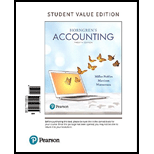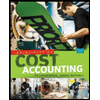
Horngren's Accounting, Student Value Edition (12th Edition)
12th Edition
ISBN: 9780134487151
Author: Tracie L. Miller-Nobles, Brenda L. Mattison, Ella Mae Matsumura
Publisher: PEARSON
expand_more
expand_more
format_list_bulleted
Concept explainers
Textbook Question
Chapter 19, Problem S19.6SE
Allocating
Learning Objective 3
Job 303 includes direct materials costs of $550 and direct labor costs of $400. If the predetermined overhead allocation rate is 40% of direct labor cost, what is the total cost assigned to Job 303?
Expert Solution & Answer
Want to see the full answer?
Check out a sample textbook solution
Students have asked these similar questions
MCQ
Subject. General Account
Provide answer this following requirements on these financial accounting question
Chapter 19 Solutions
Horngren's Accounting, Student Value Edition (12th Edition)
Ch. 19 - Prob. 1QCCh. 19 - When a manufacturing company uses direct...Ch. 19 - When a manufacturing company uses indirect...Ch. 19 - When a manufacturing company uses direct labor, it...Ch. 19 - What is Gell's predetermined overhead allocation...Ch. 19 - What is Gell's actual manufacturing overhead cost?...Ch. 19 - How much manufacturing overhead would Gell...Ch. 19 - What entry would Gell make to adjust the...Ch. 19 - A manufacturing company completed work on a job....Ch. 19 - Prob. 10QC
Ch. 19 - Why do managers need to know the cost of their...Ch. 19 - What types of companies use job order costing...Ch. 19 - What types of companies use process costing...Ch. 19 - What is the purpose of a job cost record?Ch. 19 - Explain the difference between cost of goods...Ch. 19 - A job was started on May 15, completed on June 27,...Ch. 19 - Give the journal entry for raw materials purchased...Ch. 19 - What is the purpose of the raw materials...Ch. 19 - How does the use of direct and indirect materials...Ch. 19 - Give the journal entry for direct and indirect...Ch. 19 - Give five examples of manufacturing overhead...Ch. 19 - What is the predetermined overhead allocation...Ch. 19 - What is an allocation base? Give some examples.Ch. 19 - How is manufacturing overhead allocated to jobs?Ch. 19 - A completed job cost record shows the unit cost of...Ch. 19 - Explain the journal entry for the allocation of...Ch. 19 - Give the journal entry for the completion of a...Ch. 19 - Why does the sale of a completed job require two...Ch. 19 - Prob. 19RQCh. 19 - If a company incurred $5,250 in actual overhead...Ch. 19 - Refer to the previous question. Give the journal...Ch. 19 - Explain the terms accumulate, assign, allocate,...Ch. 19 - Why would the manager of a service company need to...Ch. 19 - How is the predetermined overhead allocation rate...Ch. 19 - Distinguishing between job order costing and...Ch. 19 - Accounting for materials Back Country manufactures...Ch. 19 - Accounting for materials Learning Objective 2...Ch. 19 - Accounting for labor Learning Objective 2...Ch. 19 - Accounting for overhead Learning Objective 3 Oak...Ch. 19 - Allocating overhead Learning Objective 3 Job 303...Ch. 19 - Calculating predetermined overhead allocation...Ch. 19 - Completing and selling products Learning Objective...Ch. 19 - Comparing actual to allocated overhead Learning...Ch. 19 - Calculating under/overallocated overhead Learning...Ch. 19 - Prob. S19.11SECh. 19 - Prob. S19.12SECh. 19 - Prob. S19.13SECh. 19 - Prob. S19.14SECh. 19 - Distinguishing between job order costing and...Ch. 19 - Defining terminology Learning Objectives 1,2 Match...Ch. 19 - E19-17 Accounting for job costs
Learning Objective...Ch. 19 - E19-18 Recording materials and labor...Ch. 19 - Prob. E19.19ECh. 19 - Allocating and adjusting manufacturing overhead...Ch. 19 - Prob. E19.21ECh. 19 - Prob. E19.22ECh. 19 - Prob. E19.23ECh. 19 - Preparing job order costing journal entries...Ch. 19 - Prob. E19.25ECh. 19 - E19-26 Determining missing amounts
Learning...Ch. 19 - Prob. E19.27ECh. 19 - Prob. P19.28APGACh. 19 - Prob. P19.29APGACh. 19 - Prob. P19.30APGACh. 19 - Prob. P19.31APGACh. 19 - Prob. P19.32APGACh. 19 - Prob. P19.33APGACh. 19 - Prob. P19.34BPGBCh. 19 - Prob. P19.35BPGBCh. 19 - Prob. P19.36BPGBCh. 19 - Prob. P19.37BPGBCh. 19 - Prob. P19.38BPGBCh. 19 - Using job order costing in a service company...Ch. 19 - Using Excel to calculate a predetermined overhead...Ch. 19 - P19-41 Accounting for manufacturing overhead
This...Ch. 19 - Prob. 19.1TIATCCh. 19 - Prob. 19.1DCCh. 19 - Prob. 19.1FC
Knowledge Booster
Learn more about
Need a deep-dive on the concept behind this application? Look no further. Learn more about this topic, accounting and related others by exploring similar questions and additional content below.Similar questions
- Actual profit?arrow_forwardAt the beginning of the year, a company estimates the following manufacturing costs for the next period: direct labor, $860,000; direct materials, $527,000; and factory overhead, $245,000. 1. Compute its predetermined overhead rate as a percent of direct labor. 2. Compute its overhead cost as a percent of direct materials.arrow_forwardHow much is the contribution margin?arrow_forward
- Provide Answerarrow_forwardHello tutor solve this question and accounting answerarrow_forwardGeneral Account - If total assets decreased by $29,000 during a period of time and owner's equity increased by $23,000 during the same period, then the amount and direction (increase or decrease) of the period's change in total liabilities is _.arrow_forward
arrow_back_ios
SEE MORE QUESTIONS
arrow_forward_ios
Recommended textbooks for you
 Principles of Cost AccountingAccountingISBN:9781305087408Author:Edward J. Vanderbeck, Maria R. MitchellPublisher:Cengage Learning
Principles of Cost AccountingAccountingISBN:9781305087408Author:Edward J. Vanderbeck, Maria R. MitchellPublisher:Cengage Learning College Accounting, Chapters 1-27AccountingISBN:9781337794756Author:HEINTZ, James A.Publisher:Cengage Learning,
College Accounting, Chapters 1-27AccountingISBN:9781337794756Author:HEINTZ, James A.Publisher:Cengage Learning, Managerial Accounting: The Cornerstone of Busines...AccountingISBN:9781337115773Author:Maryanne M. Mowen, Don R. Hansen, Dan L. HeitgerPublisher:Cengage Learning
Managerial Accounting: The Cornerstone of Busines...AccountingISBN:9781337115773Author:Maryanne M. Mowen, Don R. Hansen, Dan L. HeitgerPublisher:Cengage Learning

Principles of Cost Accounting
Accounting
ISBN:9781305087408
Author:Edward J. Vanderbeck, Maria R. Mitchell
Publisher:Cengage Learning

College Accounting, Chapters 1-27
Accounting
ISBN:9781337794756
Author:HEINTZ, James A.
Publisher:Cengage Learning,

Managerial Accounting: The Cornerstone of Busines...
Accounting
ISBN:9781337115773
Author:Maryanne M. Mowen, Don R. Hansen, Dan L. Heitger
Publisher:Cengage Learning
Cost Accounting - Definition, Purpose, Types, How it Works?; Author: WallStreetMojo;https://www.youtube.com/watch?v=AwrwUf8vYEY;License: Standard YouTube License, CC-BY